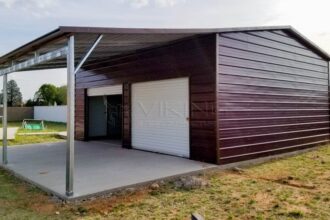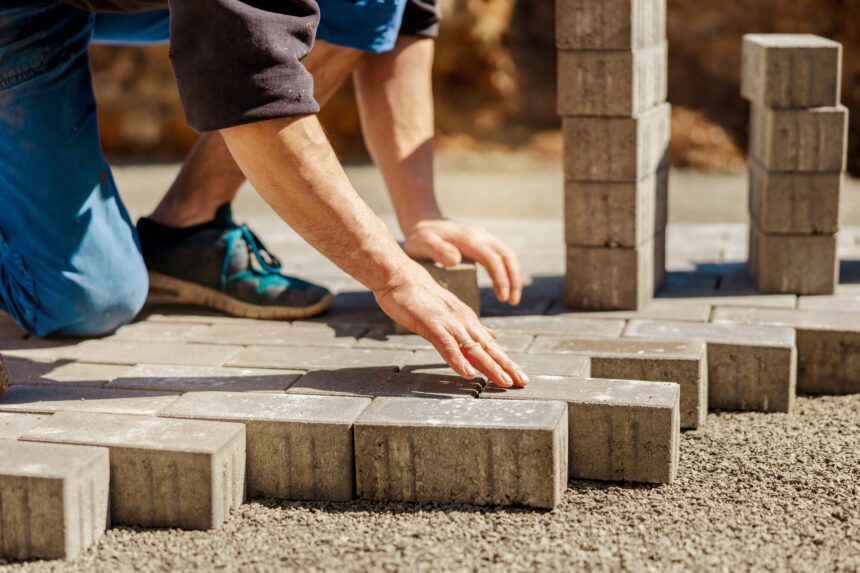Pavers are a versatile and stylish solution for enhancing outdoor spaces. They come in various materials, each with unique characteristics and ideal uses. Understanding the different types of pavers and their applications can help you choose the best option for your project, ensuring both functionality and aesthetic appeal. In this article, we’ll explore the different types of pavers and their best uses.
1. Concrete Pavers
Characteristics:
- Versatile and Affordable: Concrete pavers are a popular choice due to their affordability and wide range of shapes, sizes, and colors.
- Durable: They are strong and can withstand heavy traffic, making them suitable for various applications.
- Customizable: Can be dyed or stained to match specific color schemes.
Best Uses:
- Driveways: Their durability and strength make them ideal for withstanding the weight of vehicles.
- Patios: Available in numerous designs, they can create a stylish and functional outdoor living space.
- Walkways: Provide a safe and aesthetically pleasing path through gardens and yards.
2. Brick Pavers
Characteristics:
- Timeless Appeal: Brick pavers offer a classic, rustic look that can enhance the charm of any outdoor space.
- Eco-Friendly: Made from natural clay, they are an environmentally friendly option.
- Durable: Known for their strength and resistance to wear and tear.
Best Uses:
- Pathways: Their traditional look is perfect for garden paths and walkways.
- Patios: Offer a warm, inviting atmosphere for outdoor gatherings.
- Driveways: Can handle moderate traffic and add a historic feel to the property.
3. Natural Stone Pavers
Characteristics:
- Unique Beauty: Each stone is unique, providing a natural and luxurious appearance.
- Highly Durable: Stones like granite, slate, and limestone are incredibly durable and weather-resistant.
- Variety of Options: Available in multiple types, including flagstone, bluestone, and travertine.
Best Uses:
- High-End Patios: Perfect for creating an elegant outdoor living area.
- Pool Decks: Their natural texture provides slip resistance and a luxurious look.
- Walkways: Adds a touch of sophistication and blends seamlessly with natural surroundings.
4. Porcelain Pavers
Characteristics:
- Modern Aesthetic: Porcelain pavers offer a sleek and contemporary look.
- Water and Stain Resistant: Highly resistant to moisture, staining, and fading.
- Low Maintenance: Easy to clean and maintain, requiring minimal upkeep.
Best Uses:
- Outdoor Kitchens: Their resistance to stains makes them ideal for cooking areas.
- Modern Patios: Perfect for creating a chic, modern outdoor space.
- Pool Areas: Non-porous and slip-resistant, providing safety and style.
5. Cobblestone Pavers
Characteristics:
- Historic Charm: Cobblestones provide a quaint, old-world feel.
- Extremely Durable: Known for their long-lasting nature, often seen in historic roads that still exist today.
- Varied Shapes and Sizes: Naturally irregular, adding to their rustic appeal.
Best Uses:
- Driveways: Their durability and charm make them a standout choice for driveways.
- Walkways: Ideal for creating picturesque garden paths.
- Courtyards: Enhance the ambiance of outdoor courtyards with their unique look.
6. Rubber Pavers
Characteristics:
- Eco-Friendly: Often made from recycled materials like old tires.
- Soft and Safe: Provide a cushioned surface, reducing the risk of injury from falls.
- Slip-Resistant: Excellent traction, even when wet.
Best Uses:
- Playgrounds: The cushioning effect makes them perfect for areas where children play.
- Gym Floors: Ideal for home gyms and exercise areas due to their shock-absorbing qualities.
- Pool Decks: Slip-resistant and comfortable underfoot, enhancing pool safety.
7. Permeable Pavers
Characteristics:
- Environmental Benefits: Allow water to pass through, reducing runoff and promoting groundwater recharge.
- Sustainable: Often made from eco-friendly materials and support sustainable landscaping practices.
- Functional and Attractive: Combine practicality with visual appeal.
Best Uses:
- Driveways: Help manage stormwater runoff and prevent flooding.
- Parking Lots: Eco-friendly option for commercial and residential parking areas.
- Walkways and Patios: Blend seamlessly with natural landscapes while promoting sustainability.
Conclusion
Choosing the right type of paver for your project depends on your specific needs, style preferences, and the intended use of the space. Whether you’re looking for the affordability and versatility of concrete, the timeless charm of brick, the luxurious appeal of natural stone, or the modern elegance of porcelain, there’s a paver to suit every project.
By understanding the characteristics and best uses of each type of paver, you can make an informed decision that enhances both the functionality and beauty of your outdoor space. So, take your time, explore your options, and create an outdoor area that you’ll enjoy for years to come. Happy paving!




